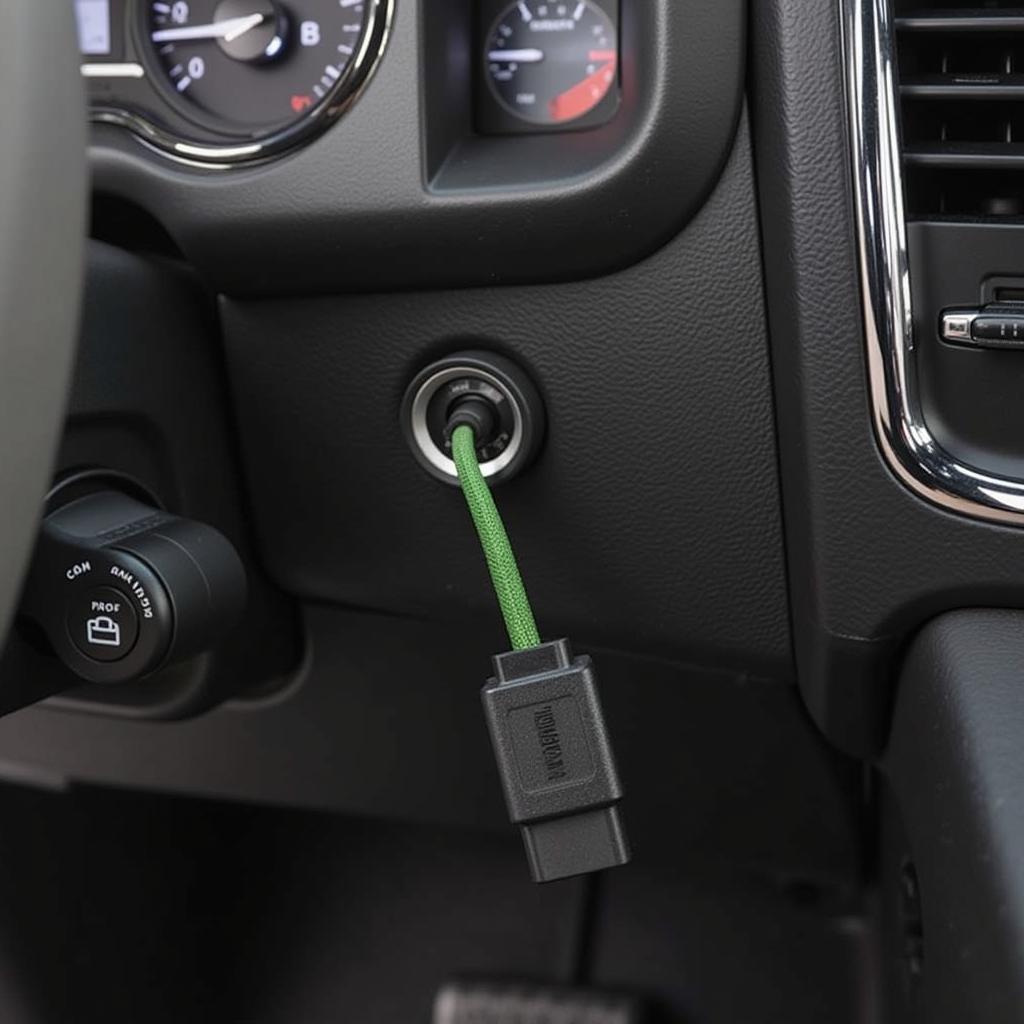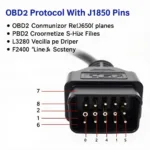Imagine turning the key in your Dodge Ram, only to be met with silence. After multiple attempts, you realize something’s wrong: your truck only starts with the OBD2 scanner plugged in. This frustrating issue can leave you stranded and scratching your head. Don’t worry, we’re here to break down the potential causes and provide you with the information you need to get your Dodge Ram back on the road.
Why Does My Dodge Ram Rely on the OBD2 Scanner to Run?
The OBD2 (On-Board Diagnostics 2) system in your Dodge Ram acts like the vehicle’s brain, constantly monitoring various sensors and systems. When the OBD2 scanner is plugged in, it communicates with the vehicle’s computer, reading and clearing diagnostic trouble codes (DTCs) that pinpoint potential issues. However, your Dodge Ram should start and run even without the scanner connected. If it doesn’t, it signifies a problem that needs immediate attention.
Common Culprits Behind the OBD2 Dependency
Several potential culprits could be causing your Dodge Ram’s reliance on the OBD2 scanner. While this list doesn’t cover every possibility, it addresses the most common issues experienced by Dodge Ram owners:
- Faulty Crankshaft Position Sensor: This sensor plays a vital role in engine timing and fuel injection. If it malfunctions, the engine control unit (ECU) might not receive the correct signals to initiate starting.
- Defective Camshaft Position Sensor: Working in tandem with the crankshaft sensor, the camshaft sensor helps determine the position of the camshaft, influencing ignition timing and fuel delivery. A faulty sensor can disrupt this synchronization, preventing the engine from starting.
- Wiring Harness Problems: The wiring harness connects various sensors and components to the ECU. Damaged, corroded, or loose connections within the harness can interrupt communication, leading to starting issues.
- Malfunctioning ECU: While less common, a failing ECU can disrupt various systems, including the starting sequence. If the ECU can’t communicate effectively, your Dodge Ram might not start without the OBD2 scanner bridging the communication gap.
Diagnosing the Problem: Beyond the OBD2 Scanner
While connecting an OBD2 scanner might seem like the obvious first step, your Dodge Ram’s reliance on it indicates a deeper issue. Here’s a more in-depth approach to diagnose the problem:
- Check for Obvious Issues: Before diving into complex diagnostics, start with the basics. Inspect the battery terminals for corrosion, ensure the battery is charged, and check for any loose or damaged wiring connections in the engine bay.
- Consult a Mechanic: If basic checks don’t reveal the culprit, it’s best to consult a qualified mechanic specializing in Dodge vehicles. They have the expertise and specialized diagnostic tools to pinpoint the root cause effectively.
- Thorough Inspection: A mechanic will likely conduct a thorough inspection of your Dodge Ram’s electrical system, focusing on the crankshaft and camshaft sensors, wiring harnesses, and the ECU. They might also use advanced diagnostic equipment to read live data streams and pinpoint the malfunctioning component.
Don’t Ignore the Warning Signs
Driving with your Dodge Ram solely reliant on the OBD2 scanner is highly discouraged and potentially dangerous. Ignoring the underlying problem can lead to:
- Sudden Engine Stalls: A failing sensor or electrical issue can cause the engine to stall unexpectedly, creating hazardous situations while driving.
- Further Damage: Continuing to drive with a faulty component can exacerbate the issue, potentially damaging other engine parts and leading to costly repairs.
- Voided Warranty: Driving with a known issue might void your Dodge Ram’s warranty, leaving you responsible for expensive repairs.
Preventative Measures for a Healthy OBD2 System
While some issues require professional attention, you can take proactive steps to maintain a healthy OBD2 system and minimize the risk of encountering this problem:
- Regular Inspections: Schedule routine maintenance checks for your Dodge Ram, including a visual inspection of the engine bay and OBD2 system components.
- Timely Repairs: Address any warning lights or error codes promptly. Ignoring minor issues can snowball into major problems down the line.
- Quality Parts: When replacing sensors or components related to the OBD2 system, opt for high-quality parts from reputable manufacturers. This ensures optimal performance and longevity.
Conclusion
A Dodge Ram that won’t run without the OBD2 plugged in signifies a potentially serious issue that requires immediate attention. While the OBD2 scanner serves as a valuable diagnostic tool, relying on it for starting indicates an underlying problem that needs professional diagnosis and repair. Remember, ignoring the issue can lead to further damage, safety hazards, and voided warranties. Consult a qualified mechanic to ensure your Dodge Ram gets back on the road safely and reliably.


